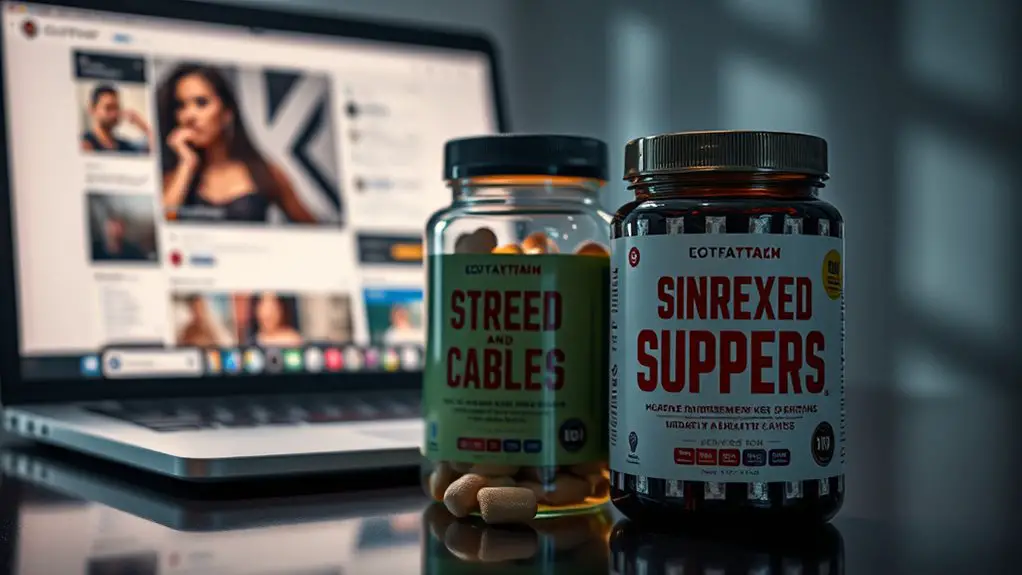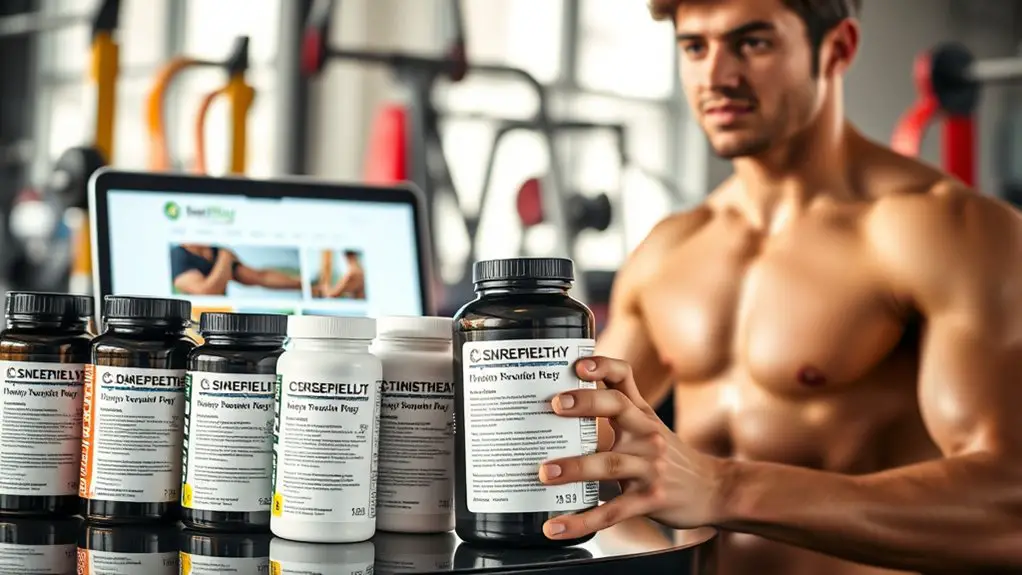The Ethics of Promoting Gym Supplements Online

Promoting gym supplements online comes with ethical responsibilities you can’t ignore. It is crucial to avoid misleading claims and maintain transparency about ingredients and potential side effects. Authentic endorsements and clear disclosures about sponsorships build trust with your audience. Remember, genuine recommendations resonate more than exaggerated promises. Engaging in ethical marketing not only protects consumers but also enhances your credibility. Want to know more about how to navigate this complex landscape?
Understanding the Market: The Rise of Gym Supplements

As the fitness industry continues to evolve, you might have noticed that gym supplements have skyrocketed in popularity. This surge reflects changing market trends and shifting consumer preferences. People are increasingly seeking ways to enhance their workouts and recovery, leading to a boom in products like protein powders, pre-workouts, and vitamins.
With this growth, it’s crucial to recognize the factors driving these trends. Consumers are more health-conscious than ever, often influenced by the latest research and fitness regimens. They’re not just looking for quick fixes; they want supplements that support overall wellness and performance.
However, with such demand comes the responsibility of ethical marketing. Companies must guarantee their claims are backed by science and that products are safe and effective. Understanding these market trends and consumer preferences will help you make informed choices while traversing the supplement landscape.
The Role of Influencers in Supplement Marketing
While the fitness industry thrives on innovation, the influence of social media personalities in supplement marketing has become a game-changer. You might wonder how influencer credibility impacts your purchasing decisions. When these personalities promote supplements, their followers often trust them, which can lead to increased sales. However, this trust comes with a responsibility.
| Influencer Traits | Marketing Ethics |
|---|---|
| Authenticity | Transparency in promotions |
| Expertise | Avoiding false claims |
| Engagement | Prioritizing consumer well-being |
It’s essential for influencers to uphold marketing ethics by being honest about their experiences with supplements. This means disclosing sponsorships and sharing realistic results. By doing so, they not only maintain their credibility but also protect their audience from potential misinformation. Ultimately, ethical influencer marketing fosters a healthier consumer environment and promotes informed decisions.
Misleading Claims and Consumer Deception

When it comes to gym supplements, you might encounter a range of misleading claims that promise miraculous results. These false advertising tactics can trick consumers into spending money on products that don’t deliver. Unfortunately, regulatory oversight often struggles to keep up with the fast-paced supplement market, leaving you vulnerable to deception.
False Advertising Tactics
How often do we encounter gym supplements that promise miraculous results? You might be surprised at how many brands use false testimonials and deceptive packaging to lure you in. These tactics can lead to unrealistic expectations and disappointment. To better understand these methods, here’s a quick comparison:
| False Advertising Tactics | Examples |
|---|---|
| False Testimonials | “I gained 20 lbs of muscle!” |
| Deceptive Packaging | “100% natural” (with additives) |
| Unrealistic Claims | “Lose 10 lbs in a week!” |
| Fake Endorsements | Celebrity endorsements lacking verification |
It’s essential to be aware of these tactics. Always research products and consult professionals before investing your hard-earned money. Your health deserves better than empty promises!
Regulatory Oversight Challenges
Despite the growing popularity of gym supplements, regulatory oversight remains a significant challenge in ensuring consumer protection. Many companies exploit enforcement challenges, making misleading claims that can deceive consumers. You might not realize that these products often lack proper regulatory compliance, leading to serious risks.
- Supplements may contain undisclosed ingredients.
- Claims about effectiveness can be exaggerated or false.
- There’s often limited accountability for manufacturers.
- Consumers might be unaware of potential health risks.
Navigating this landscape is tricky, but being informed helps you make better choices. Always research and verify claims before purchasing. Regulatory bodies need to strengthen their enforcement, but until then, you play a crucial role in protecting yourself from potential deception in the supplement industry.
The Importance of Transparency in Ingredients
While the fitness industry continues to grow, the importance of transparency in ingredients cannot be overstated. You deserve to know exactly what you’re putting into your body, and that starts with understanding ingredient sourcing. When brands disclose where their ingredients come from, it builds trust and guarantees you’re making informed choices.
Transparency isn’t just about listing ingredients; it’s also about educating consumers on what those components do and how they contribute to your fitness goals. This kind of consumer education empowers you to differentiate between effective supplements and those that may not deliver on their promises.
Brands that prioritize transparency demonstrate a commitment to ethical practices, fostering a healthier relationship between you and the products you consume. So, when considering gym supplements, always look for clear, honest labeling and a brand’s willingness to share information about their ingredient sourcing. Your health and fitness journey deserve nothing less.
Health Risks and Safety Concerns

When considering gym supplements, it’s vital to pay attention to ingredient transparency, as not all products are created equal. Many supplements can have potential side effects that you might not be aware of, which makes understanding what’s in them essential for your health. By staying informed, you can make safer choices that align with your fitness goals.
Ingredient Transparency Importance
Ingredient transparency is crucial in the gym supplement industry, as it directly impacts your health and safety. When you can’t trust what’s in a supplement, you risk potential adverse effects. Here are a few reasons why ingredient transparency matters:
- Ingredient Sourcing: Knowing where ingredients come from can help you avoid harmful additives or allergens.
- Label Accuracy: Accurate labels guarantee you’re aware of what you’re consuming, empowering you to make informed choices.
- Quality Assurance: Transparency often correlates with higher quality products, giving you peace of mind.
- Regulatory Compliance: Transparent brands are more likely to adhere to safety regulations, protecting your health.
Choosing supplements with clear ingredient transparency is crucial for your well-being and can help you achieve your fitness goals safely.
Potential Side Effects
Have you ever considered the potential side effects of gym supplements? Many people overlook this essential aspect in their quest for fitness. While supplements can enhance performance, they may also carry health risks, ranging from mild digestive issues to severe reactions like heart problems or liver damage. That’s why side effects awareness is critical. You should educate yourself and others about these risks before diving into any regimen. Consumer education is key—understanding what you’re putting in your body helps you make informed decisions. Always consult a healthcare professional before starting new supplements, and read reviews from credible sources. Prioritizing safety guarantees your fitness journey remains healthy and effective, rather than risking negative impacts on your well-being.
Ethical Marketing Practices in the Fitness Industry
While the fitness industry is often associated with intense competition and aggressive marketing tactics, ethical marketing practices are essential for building trust between brands and consumers. By prioritizing ethical advertising and consumer education, you can foster a positive relationship with your audience. Here are some key practices to evaluate:
- Transparency: Always disclose ingredients, sourcing, and potential side effects of gym supplements.
- Honesty: Avoid exaggerated claims about results; instead, provide realistic expectations.
- Education: Share informative content that helps consumers understand the benefits and risks associated with supplements.
- Responsibility: Promote a balanced approach to fitness that includes diet, exercise, and lifestyle, rather than relying solely on supplements.
The Impact of Social Media on Consumer Behavior

As social media continues to shape modern communication, its influence on consumer behavior in the fitness industry has become undeniable. You might notice how platforms like Instagram and TikTok amplify social influence, creating trends that can sway your purchasing decisions. When a fitness influencer showcases a gym supplement, it often leads to an immediate spike in interest and sales.
However, this phenomenon raises questions about consumer trust. Are you basing your choices on genuine recommendations or just the latest fad? It’s crucial to differentiate between authentic experiences and marketing tactics. Transparency in endorsements fosters trust, allowing you to make informed decisions. As you navigate the online landscape, consider the credibility of the sources you follow. Ultimately, being aware of social media’s impact can empower you to make choices that align with your fitness goals, rather than simply following the crowd.
Regulatory Oversight and the Need for Standards
Despite the booming popularity of gym supplements, regulatory oversight in this sector remains inconsistent, leaving consumers vulnerable to misinformation. Without strong regulatory frameworks and clear industry standards, it’s tough for you to know which products are truly safe and effective. Here’s what you should consider:
- Many supplements lack rigorous testing before hitting the market.
- Claims made by manufacturers are often unverified and misleading.
- The absence of labeling requirements can hide harmful ingredients.
- Consumer protection varies widely across different regions.
As a responsible consumer, you need to stay informed about the supplements you choose. Advocating for improved regulations and industry standards can help guarantee that what you’re buying is safe and beneficial. In this ever-evolving market, the call for accountability is more important than ever to safeguard your health and well-being.
Building Trust: Best Practices for Promoting Supplements

Building trust in the gym supplement market hinges on transparency and ethical promotion. To foster trust building, always disclose if you have any financial ties to the products you’re endorsing. This honesty helps your audience feel confident in your recommendations. Additionally, prioritize ethical endorsements by collaborating with reputable brands that adhere to quality standards and safety regulations.
Share real customer testimonials and evidence-based research to back up your claims. This not only enhances your credibility but also provides your audience with the necessary information to make informed decisions. Avoid making exaggerated promises about results; instead, focus on realistic outcomes that align with users’ experiences.
Engaging with your audience through comments or Q&A sessions can also strengthen trust. When your followers see you’re approachable and responsive, they’re more likely to view you as a reliable source. Remember, trust takes time to build, but it pays off in the long run.
Frequently Asked Questions
Are Gym Supplements Safe for Everyone to Use?
When it comes to gym supplements, you might wonder about their safety for everyone. While many supplements can enhance performance, not all are suitable for every individual. It’s essential to evaluate supplement safety, as some can cause adverse effects or interact with medications. Always prioritize your health by consulting a healthcare professional before starting any supplement. Remember, what works for one person may not be safe for you, so stay informed and cautious!
How Can I Spot Fake Reviews for Supplements?
Did you know that around 30% of online reviews are estimated to be fake? To spot fake reviews for supplements, look for certain indicators. If a review lacks specific details or seems overly positive, it could be suspicious. Identifying review patterns can help, too—if a product has a sudden influx of five-star ratings, it might be a red flag. Always trust your instincts and cross-check reviews across multiple platforms for authenticity.
What Qualifications Should Supplement Promoters Have?
When considering qualifications for supplement promoters, look for individuals with nutrition expertise, like registered dietitians or certified nutritionists. These professionals understand the science behind supplements and can offer reliable advice. Additionally, they should have a grasp of regulatory compliance to guarantee they’re promoting products that meet safety standards. This combination helps you trust their recommendations, assuring you’re making informed choices about what you’re putting into your body.
Can Gym Supplements Replace a Balanced Diet?
No, gym supplements can’t replace a balanced diet. While they can help fill nutritional deficiencies, they shouldn’t be your main source of nutrition. A well-rounded diet provides essential vitamins, minerals, and fiber that supplements alone can’t offer. Focusing solely on supplements might lead to dietary imbalances and long-term health issues. It’s important to prioritize whole foods for peak health while using supplements as an occasional boost, not a substitute.
How Do I Report Misleading Supplement Advertisements?
If you’ve spotted some seriously sketchy supplement sales, don’t stay silent! Start by gathering evidence of those misleading claims; screenshots, links, or any ads will help. Next, report it to the Federal Trade Commission (FTC) or your local consumer protection agency, as they enforce advertising regulations. You can also notify the company directly. Taking these steps helps guarantee that consumers are protected from false information and encourages ethical marketing practices.





